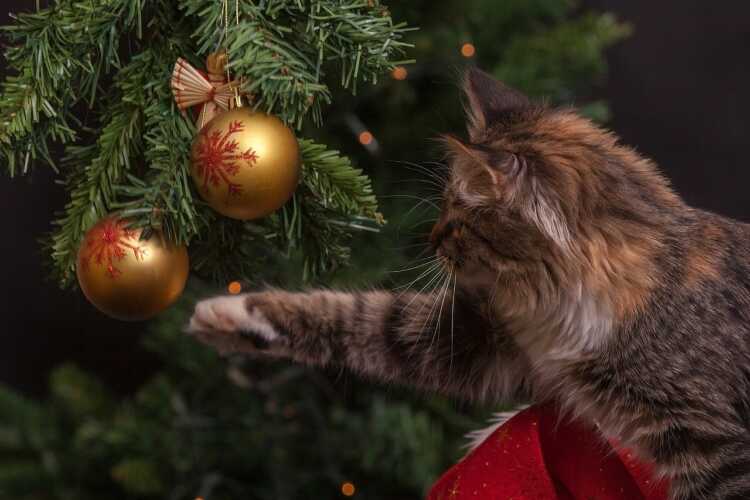Are Christmas Trees Poisonous To Cats?
Christmas is time for cheer and loads of love! The best part of this festive season is the decor. However, in some ways, these decorations can be quite dangerous. There are fire hazards, trees falling over, ornaments breaking, and then there are your pets you have to think of. Cats, in particular, are usually fond of your Christmas decorations – especially your Christmas tree. And can you blame them? They smell great, they are fun, and they are trees. However, some trees can be toxic to cats.
 Indeed, They Are!
Indeed, They Are!
First, let’s consider the decorations on the tree. The tinsel and ornamental Christmas balls look like everyday toys to your cats. This is usually the reason why they would climb up the tree, giving us the viral funny cat videos we often see on the internet. This also puts them at risk of swallowing material they should not or breaking some of your Christmas tree decorations and injuring themselves. Ingesting the tinsel and angel hair on the tree could cause serious illnesses, and in many cases, these are fatal.
Cat owners know the fascination cats have for lights. Your Christmas lights may make your tree beautiful and put your home in a joyous Christmas spirit, but your cat may have other plans. If your cats chew the lights’ wiring, they may ingest harmful chemicals or, if the lights are plugged in, there is likely to be electrocution.
Another dangerous yet seemingly harmless Christmas tree ornament is the snow globe. Some snowglobes contain ethylene glycol, also known as antifreeze, which is harmful to your cat. If the snow globe breaks, your cat may become ill from ingesting it or even become sick from having it on its fur! You must have these ornaments far from your cat’s reach to ensure its safety. Now, let’s look at how Christmas trees are poisonous to cats.
Real or Fake Christmas Trees
Whether real or fake, your Christmas tree can be regarded as mildly toxic for your cat. Usually, the nibbling on fir trees causes some irritation in your cat’s mouth. In many cases, the oils fir trees produce cause an upset stomach for your cat. This leads to gastrointestinal distress issues, which may lead to excessive vomiting cramps, drooling, and diarrhea depending on which parts of the tree it ingests. In other cases, cats have developed severe constipation and kidney and liver failure. The tree needles can even puncture the cat’s intestinal lining.
More dangerous is the tree water. When you keep a real fir tree in your house as a Christmas tree, the tree water keeps the tree looking fresh and healthy. For the water to carry out this job, it contains a heavy mixture of pesticides, preservatives, and other chemicals like aspirin. Naturally, your cat may drink out of this harmful water bowl- poisoning it and making it sick. Unfortunately, fake Christmas trees are not any safer for your cats too. The fake tree needles can also injure the intestinal and stomach lining of your cat. When your cat nibbles on the artificial Christmas tree, it comes in contact with resin, which is harmful.
How To Cat-proof Your Christmas Tree
So, with all these possible dangers, does it mean cat owners would have to forfeit getting a Christmas tree on Christmas day? Of course not. You can put several measures in place to ensure that your cat is safe and still have your Christmas tree around to boost your cheerful spirit. Here are a few steps you can implement to cat-proof your Christmas tree:
- Consider setting up a pen, like that used to keep dogs in one part of the house. This acts as a blockade between your cat and your Christmas tree and prevents the possible accidents that may come with having them too close.
- If you choose to use a real fir tree as your Christmas tree, ensure that you have covered the tree water bowl with a tree skirt. You can also place presents on top of the tree skirt to deter your cats from drinking harmful water.
- Concerning your decorations, you should consider placing your ornaments higher up on the tree. This makes it challenging for your cat to reach.
- As mentioned earlier, your cats would love to jump on your Christmas tree, which can lead to it toppling over and, in turn, cause injuries. To avoid this, you should invest in a good quality heavy base or weigh the tree down by placing weights on either side to keep it anchored. You should keep the tree away from furniture or any “launching zones” to prevent your cat from jumping on it.
- You can create a separate room for your playful, mischievous cat. This way, you do not give them any access to the room the Christmas tree is in. It also keeps your mind at ease from any possible accidents when you are away from home.
- Implement strategies to steer your cat away from the tree. For example, cats generally do not like citrus scents. Therefore, you can spread lemon and orange peels around the base of the tree to prevent them from getting close.
What To Do If Your Cat Gets Poisoned
Although you would want to take good care of your cat, sometimes their curiosity is unbeatable. Your cat may have sneaked-attacked your Christmas tree or found a smart way to pounce on the tree despite your efforts. If you think your cat may have been poisoned, do not attempt to make them feel better with human medications. It may sound a bit obvious. However, many believe that medicines that cure certain human conditions can do the same thing for their pets. The opposite is true. Human medications are very harmful to your cats.
Instead, you should call your local vet right away. Luckily, the holiday season would not be a problem as all veterinary practices have emergency services available during such times. You should take samples of what you think your cat may have ingested along to give the vet an idea of the possible problems and for them to provide an accurate solution. Since symptoms of illnesses such as kidney disease may mirror poisoning, you would want to take your cat to the vet to receive the diagnosis and the right prescription.
How To Avoid Stress For Cats During Christmas Time
With all these restrictions on your cat’s curious, playful, and mischievous nature, Christmas time can be quite stressful for your furry friend. Additionally, with all the new faces and an increased number of people at home, your cat would be overwhelmed. You should try to make the season a joyful one for your cat, just as it is for you. Here are a few ways you can make the season less stressful for your cats:
- Do not stress. Although there seem to be many hazards your cat may be exposed to during this season, you should not be worried about it. Instead, ensure that you have implemented sufficient measures to prevent any accidents during the season.
- If you have children coming over, supervise their time with your cats. The new faces can be overwhelming for them. If the cat is not used to having children around, this may make them anxious and aggressive. Be sure that the children do not poke the cat or do other things to make your cat uncomfortable.
- Your cats love their space. Therefore, create a safe, quiet space for them away from the Christmas commotion- like a spare bedroom. Be sure that the room is equipped with everything they need to prevent them from coming out unless they need to.
- Cat’s usually mark their space with various scents. Although you want your home clean and fresh for your Christmas visitors, excessive cleaning and moving of furniture can disorient your cat, making them feel unsafe. Therefore, try as much as possible to make little but significant changes to your furniture positionings. Going for sprays or diffusers that release comforting pheromones may help ease your cat’s anxiety during this period.
- Many cat owners leave their cats with a cattery or pet sitter to be on the safer side. However, if you choose to do this, ensure that you provide them all the necessary contact details in the case of an emergency. This would include your contact detail and your cat’s vet’s contact details as well. You should drop your cat off with some comfort items such as toys and blankets, so it does not feel too homesick during its time away.
Christmas is a joyful time of the year, and it is agreeably not the right time to deal with injuries and other mishappenings, especially with your pet. Now that you have gained some insight into the possible dangers your cat may be exposed to during this festive season. Be sure to implement the measures mentioned above. You can also consult your vet or other animal shelters for more education on what dangers you should look out for and how you can prevent them and ensure your cat’s safety.





